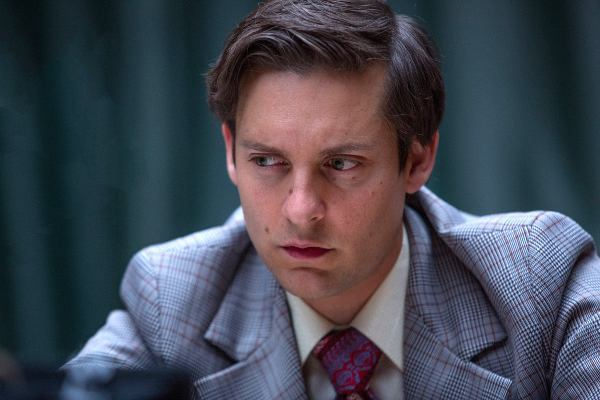
True story “Pawn Sacrifice” is Cold War thriller as chess game
– FILM REVIEW – By Cate Marquis –
Tobey Maguire turns in a riveting, Oscar-worthy performance as eccentric chess genius Bobby Fischer in the Cold War thriller “Pawn Sacrifice.” The film traces Fischer’s emergence as chess prodigy from his troubled childhood, his game-changing innovations and the legendary championship showdown between the world’s two best chess players, Bobby Fischer and Boris Spassky. The tournament dominated worldwide media coverage, which covered it like a Olympic game, proxy battle between the Soviet Union and the United States, the world’s two superpowers.
“Pawn Sacrifice” is based on a true story but, basically, it is a gripping psychological thriller. The film is directed by Edward Zwick, whose previous films include the WWII thriller “Defiance,” and he focuses on the mysterious, complex personality at the center of this story. Chess is a contest of wills and skills, and the film is structured like a sports movie, which is how the real match was presented. Strange as it may seem, the public was gripped by this contest between two chess greats, presented as a proxy battle between the Cold War adversaries, the U.S. and Soviet Russia, much like the Olympics. In 1972, with the Vietnam War and the Watergate scandal filling the news, much of the world’s focus was on a chess game, as the reigning champion, Russian Boris Spassky (Liev Schreiber), was challenged by American Bobby Fischer (Maguire).
The Fischer-Spassky match was called “The Match of the Century” and received worldwide media coverage. The match was treated like a battle between the communist Soviet Union and the capitalist U.S.A. But something else added to the media circus – Fischer’s odd demands, erratic behavior, eccentric personality, growing paranoia, as his mental health deteriorated. There was a race by Fischer’s manager and coach to keep him together enough to finish the high-stake match.
The roots of this David and Goliath showdown was set years earlier when a poor American kid from Brooklyn emerged as a chess genius with the potential to challenge the Russians’ long domination of the game. The charming, outspoken, self-confident teenaged Bobby Fischer captured the public imagination, much as Tiger Woods did in his sport, and sparked an American craze for chess. The teenaged Fischer was good television too, a nice looking Brooklyn kid with a ready quip, tons of confidence and a charming smile. When Fischer set out to become the youngest world chess champion by challenging the Soviet’s Boris Spassky, the whole country cheered him on with a patriotic Cold War fervor.
The film’s title refers to a chess move in which a pawn is sacrificed in order to gain a better position on the board, which the film suggests is what the U.S. did in pushing the mentally-unraveling Fischer. Fischer was brilliant at chess but he was slipping into paranoia and undiagnosed mental illness by the time of his 21-game match against Spassky. Despite his mental health problems, and later embrace of a conspiracy theory with anti-Russian and antisemitic themes (although Fischer’s family was Jewish), he was a chess innovator who changed the game.
The film’s emotional power and its high-octane tensions are largely thanks to the actors’ terrific performances. Maguire delivers what may be one of his best performances, an Oscar-worthy turn as the complex Fischer, capturing his youthful bravura, outspokenness and quips that made him popular with the media and then his growing paranoia and mental decline. But Maguire’s strong work is matched by great performances by Liev Schreiber as Boris Spassky, Peter Sarsgaard as Fischer’s trainer Father William Lombardy, and Michael Stuhlbarg as the chess genius’ manager Paul Marshall. Lily Rabe does well in her smaller but critical role as Fischer’s sister Joan, with whom he was close despite his estrangement from their mother (Robin Weigert).
When the round-robin structure of the tournament allowed the Russians to block a match between Spassky and Fischer, Fischer wrote an article in Sports Illustrated accusing the Russians of collusion and pushed for changes and the institution of rules that led to professional chess. Before Bobby Fischer, there was no professional chess, according to chess grandmaster Maxim Dlugy, who was in St. Louis for the recent Sinquefield Cup chess championship, where there was a preview showing of “Pawn Sacrifice.”
“Pawn Sacrifice” is based on a true story, meaning the reality was more complicated than the “Rocky” type contest some moviegoers might expect. The film is an engrossing real-life tale of a complex chess genius and a pivotal event.
© Cate Marquis
